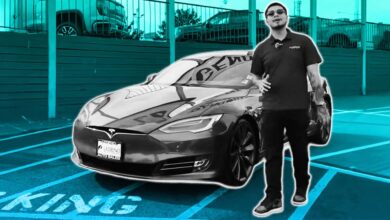The EV ‘Mandate’ May Not Be Dead In Congress Yet

The Trump administration’s efforts to repeal the Biden-era electric-vehicle rules just ran into a wall in the Senate.
The Senate Parliamentarian—which is the Senate’s top rules expert—said on Friday that removing the emissions rules doesn’t count as a tax or spending issue and hence they can’t be included in the budget reconciliation bill. The news was first reported by the Detroit Free Press.
“Tonight, the Senate Parliamentarian advised that certain provisions in the Republicans’ One Big, Beautiful Betrayal will be subject to the Byrd Rule—ultimately meaning they will need to be stripped from the bill to ensure it complies with the rules of reconciliation,” Democratic Sen. Jeff Merkley said in a press release. The “Byrd Rule” requires reconciliation bills in the Senate to remain focused on budgetary issues, not policy-related ones.
In simple terms, if the Senate wants to repeal the emissions rules, it will need a 60-vote majority, which Republicans currently don’t have. The emissions rules require automakers to gradually increase the share of electric and hybrid vehicles as a part of their overall new vehicle sales from model-year 2027 onwards. The Senate can reject the parliamentarian’s recommendation, but some members have already ruled out doing so.
That means getting rid of the “EV mandate,” something Trump heavily campaigned on during his presidential run last year, is turning out to be far more complicated than once thought. Republicans currently have a 53-47 majority in the Senate, far short of the 60-vote majority required to repeal the emissions rules.
It’s worth noting that this does not save the federal tax credits, as those are categorized as budgetary. The parliamentarian’s recommendation only pertains to the EPA’s emissions rules.

Photo by: Ralph Hermens
But this could turn out to be counterintuitive. If you keep the emissions rules (the “sticks”) but remove the tax credits (the “carrots”), it would create somewhat of an imbalance. Without incentives to help consumers afford EVs, the strict emissions regulations on automakers could become harder to achieve.
That said, the EPA under the Biden administration passed in March 2024 its multi-pollutant emissions standards. Those rules recommended that automakers to sell a higher percentage of electric and hybrid vehicles from model year 2027 onwards.
The rules were far from what the Trump administration labeled as an “EV mandate.” The EPA recommended automakers sell 30-56% EVs, and the overall mix could also include standard hybrids and plug-in hybrids. The rules, if they remain in place, will save billions of metric tons of carbon dioxide and other harmful gases from entering the atmosphere, the EPA has said.
Although the EPA is now reconsidering the rules to potentially repeal and replace them with looser emissions requirements. But that process could take months if not years.
The Trump administration wants to rescind the current EPA rules, amid its other anti-EV policies like ending the federal consumer and manufacturing tax credits for EVs and other clean energy programs. We’ll keep an eye on what happens to the tax credits, but the emissions rules are certainly turning out harder to repeal than once thought.
Have a tip? Contact the author: suvrat.kothari@insideevs.com
Source link


